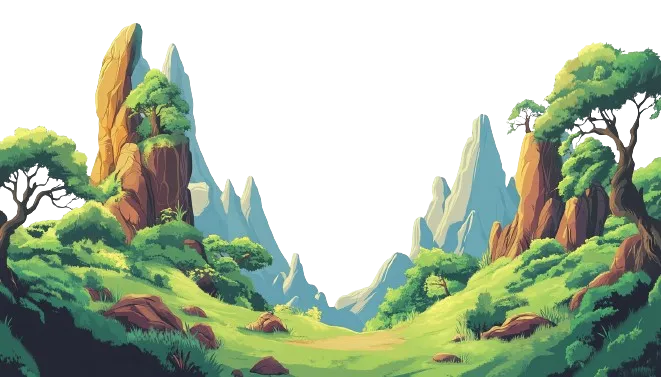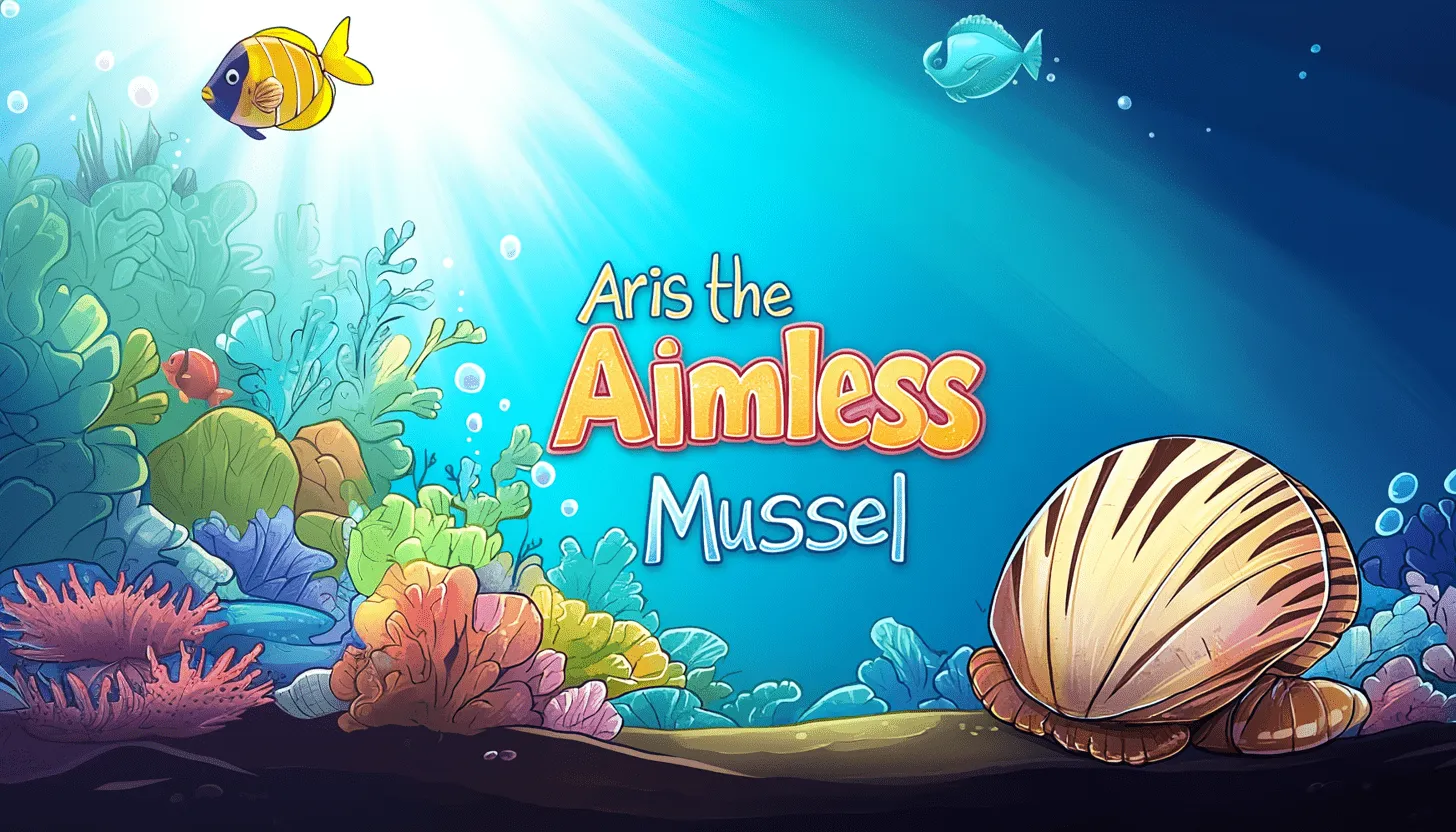Once upon a time, in the calm waters of the Great Lakes, there was a zebra mussel named Aris. Aris was no ordinary mussel. His shell had black and white stripes, making him look like a little underwater zebra. But what made him truly special was his insatiable desire for adventure.
Aris lived on a quiet rock with his fellow mussels, but he always dreamed of exploring the world beyond his home. One day, he saw a huge ship passing overhead, casting a shadow on the blue waters. “This is my chance!” Aris thought. With great effort, he detached himself from the rock and latched onto the ship's hull.
The ship sailed for days, and Aris was thrilled to feel the constant movement of the waves. Finally, the vessel arrived at a port in the Atlantic Ocean. Aris let go of the hull and began exploring the new surroundings. The flora and fauna were different, and the fish had colors and shapes he had never seen. But to his surprise, he was not welcomed.
“What are you doing here?” asked a local crab, raising its claws in defense. “You don’t belong in these waters!”
“I just wanted to explore,” Aris said, feeling a little ashamed.
“You might be causing trouble. You’re not from here, and you could harm our ecosystem,” explained the crab, with a serious tone.
Aris didn’t fully understand, but the thought that his travels could cause problems for others made him sad.
On his second journey, Aris joined an ocean current that carried him to the Pacific. There, he met an Asian clam named Mei. Mei was small but had an energetic spark and an accent that Aris found fascinating.
“Hi! Are you a traveler too?” Mei asked excitedly.
“Yes, but I’ve realized that my travels might be causing problems,” Aris replied, worried.
“That happens to me too! I love exploring new places-lei,” Mei said, her accent making her words sound like a playful song. “We need to be careful, but we can't stop exploring, right-lei?”
Aris and Mei decided to travel together, learning how to move without causing harm. They discovered that they could explore without clinging to ships or fast-moving currents, and began seeking natural ways to travel that were less invasive.
Along the way, they met a wise octopus named Octavius, who taught them about the importance of respecting ecosystems. “Curiosity is a good thing, but we must be responsible,” Octavius said, his tentacles swirling in the water. “You can be explorers and protectors of the seas at the same time.”
Aris and Mei journeyed to incredible places, from colorful coral reefs to the mysterious depths of the ocean. On a trip to the Atlantic, they met a friendly starfish named Stella, who showed them underwater caves filled with sparkling treasures.
“This is amazing! I’ve never seen anything like it,” Aris marveled at the shimmering gems covering the cave walls.
“Yes, but remember not to take anything with you. These treasures are part of our home,” Stella reminded them.
“It’s so beautiful-lei,” Mei said, looking around. “We can learn so much-lei if we just slow down-lei.”
During their adventures, Aris and Mei learned to communicate with various sea creatures. They met singing whales, playful dolphins, and fish of every imaginable color. Each encounter taught them something new and valuable.
One day, Aris and Mei decided to explore the cold waters of the North Sea. The currents were strong, but they stuck together and watched out for one another.
In a rocky bay, they met an old mussel who had traveled far in his youth. “Ah, young explorers! I too wandered the seas when I was your age,” said the old mussel with a trembling voice. “But remember, you must always respect the places you visit.”
The old mussel’s advice stuck with them. They continued their journey, ensuring they didn’t disturb the ecosystems they visited, and they taught other mussels and clams to do the same.
“It’s important to listen to our elders-lei,” Mei said, nodding. “They can teach us so much-lei.”
Over time, Aris and Mei became ambassadors of the seas, teaching other mussels and clams to travel without causing harm. They moved carefully, always looking to learn without disrupting.
One day, they returned to the Great Lakes, where Aris shared his adventures with his old friends. He spoke of Mei and everything they had learned together. His friends were amazed and proud of him.
“You’ve changed, Aris! You’re a true explorer now—respectful and wise,” they told him.
“All thanks to what we learned on our journey-lei,” Mei said with a smile.
One morning, Aris and Mei discovered an underwater cave glowing with its own light. Inside, they found phosphorescent coral they had never seen before. It was a magical sight, and they understood that the world would always have something new to offer—but they must always explore responsibly.
“It’s magnificent-lei,” Mei said, her eyes shining. “But we must be careful not to disturb what we find-lei.”
After returning to the Great Lakes, Aris and Mei began noticing something worrying. In every place they visited, other sea creatures spoke of changes in their environment: disappearing algae, missing fish, and murky waters.
One day, during a visit to the Atlantic, they encountered a group of human marine scientists. One of them, Dr. Jordan, was studying the effects of invasive species on marine ecosystems.
“Species like zebra mussels and Asian clams are beautiful, but when they reach places they don’t belong, they can cause a lot of damage,” Dr. Jordan explained to his colleagues. “They reproduce quickly and can push out native species, disrupting the ecosystem's balance.”
Aris and Mei exchanged glances, finally understanding the impact of their travels. “We’re destroying everything without meaning to-lei!” Mei said, her eyes filled with tears.
Aris and Mei met with Octavius to discuss what they had learned. “Octavius, we’ve realized that while we love exploring, we’re causing harm wherever we go,” Aris said sadly.
“That’s true,” Octavius nodded. “But now that you know, you can make choices that benefit everyone. Maybe it’s time to return home and teach others about the importance of staying in their own ecosystems.”
Aris and Mei decided to do just that. They returned to the Great Lakes and shared their adventures and lessons with other mussels and clams. They spoke about the importance of not invading other habitats and how their actions could affect other sea creatures.
“We must stay in our home-lei,” Mei said firmly. “We can make a difference from here-lei.”
Over time, Aris and Mei became leaders in their community, promoting ecosystem preservation and responsible travel. Though they missed exploring new places, they found fulfillment in protecting their home and helping others understand the importance of maintaining the natural balance.
Their stories inspired generations of sea creatures to explore with curiosity and respect, always aware of the impact of their actions. And whenever a zebra mussel or an Asian clam saw a ship or a current, they remembered the lessons of Aris and Mei, knowing they could see the world without causing harm.




